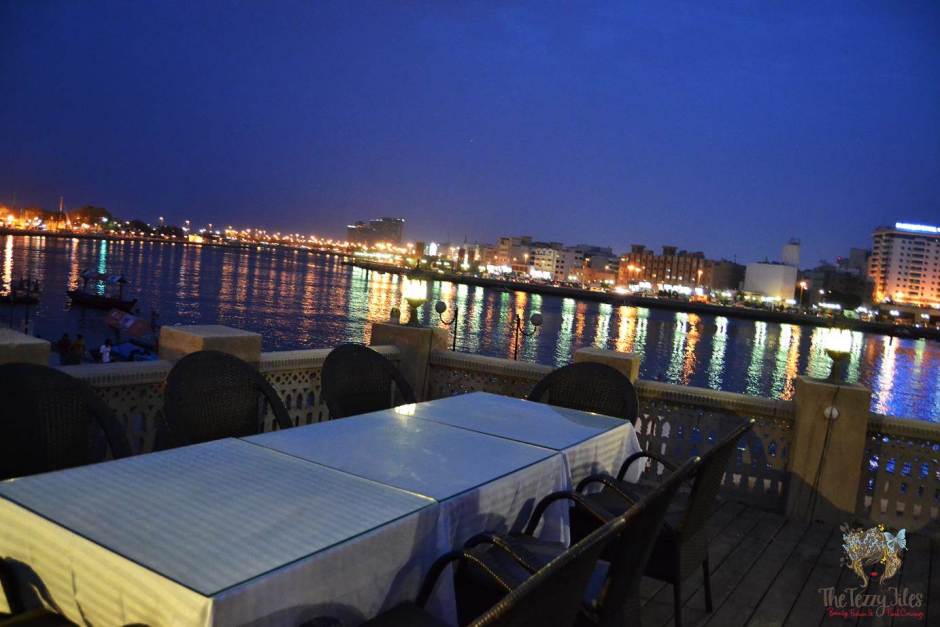Situated by the scenic waterways of the Dubai Creek, Barjeel Al Arab offers a gastronomic look into the rich cultural heritage of an Emirati past.
Barjeel Al Arab is located in the Barjeel Heritage Guesthouse, a restored historical building that has now been converted into a guest house.
Barjeel is the Arabic word for ‘wind tower’, denoting the style of Arabian architecture of the past that encouraged natural wind passages to keep the interiors cool in the heat of summer.
Walking into Barjeel Al Arab is like stepping into the magical past.
The Arabesque wooden doors open up to a beautifully done up interior that is seeped in the warmth of traditional Emirati-style hospitality.
Ornate rugs adorn the walls along with a collection of elaborate sketches depicting Bedouin life. A random collection of copper figurines take space on the makeshift shelves. Antique lanterns hang at every corner, and larger hand-painted lighting throw out a glorious array of color across the room.
Before we sit down for our meal, we asked the staff to show us around the guesthouse.
The backdoor of the restaurant opens up to a courtyard lawn. A pair of palm trees sway in the late evening breeze and throw shadows into a patch of lush green grass. The sound of trickling water from the garden fountain accentuates the peaceful calm of the beautifully serene garden.
The Barjeel Guesthouse has 9 guest rooms, and each is serviced with a personal butler and modern amenities including Wifi.
The heritage theme follows through in the room decor. The furnishing is dominated by soothing hues of wooden brown, and the upholstery takes on modest earthy tones.
Back at the restaurant, Barjeel Al Arab offers rooftop dining for larger groups. The aerial view of Deira Creek from here is simply breathtaking.
I loved this cozy cushioned corner on the roof, all done up in bright embroidery akin to Bedouin craftsmanship. I can envisage myself sitting here for hours with a good book.
For private parties, Barjeel Al Arab has a banquet hall on the roof. The hall has a warm, homely touch owing to the abstract trinkets and mellowed lighting.
Back to our dinner table downstairs, the table was set for our Emirati-style dinner.
 Notice the plates on the table? They are the vintage-style steel painted plates. I asked the staff where these can be bought, and they tell me everything used in the property has been sourced locally from the markets around Deira.
Notice the plates on the table? They are the vintage-style steel painted plates. I asked the staff where these can be bought, and they tell me everything used in the property has been sourced locally from the markets around Deira.
For appetizers, we had an assortment of Arabic dips with khubz (Arabic pita bread) including the ever popular hummus (an Arabic chickpea dip with sesame paste and olive oil) and moutabel (an Arabic dip made of roasted aubergine, sesame paste and olive oil). We also had a plate of fattoush (a tangy green Arabic salad topped with crisp, deeply fried khubz).
For the mains, we were served a platter of mixed grills. Each piece was beautifully moist and cooked to perfection.
The base of a hearty Emirati meal has to be machboos, the traditional spiced pilaf cooked in meat stock.
The machboos was accompanied with a tomato-based vegetable curry. It was mildly tangy, and beautifully aromatic.
Dessert was a shared plate of traditional Arabic sweets. These can be likened to miniature baklavas (a decadent mix of nuts enveloped in layers of puff pastry that has been soaked in a thick, sweet rose syrup).
An evening at Barjeel Al Arab is like being transported to another timeline. The chaos of city life is muffled out in the warm hospitality of the past, and the scenic views of the Deira Creek add to the serene beauty of the setting.
If you are interested in exploring Emirati culture and want a dining experience that is out of the ordinary, I suggest you give Barjeel Al Arab a go. For bookings and location, please visit their website for details.



















